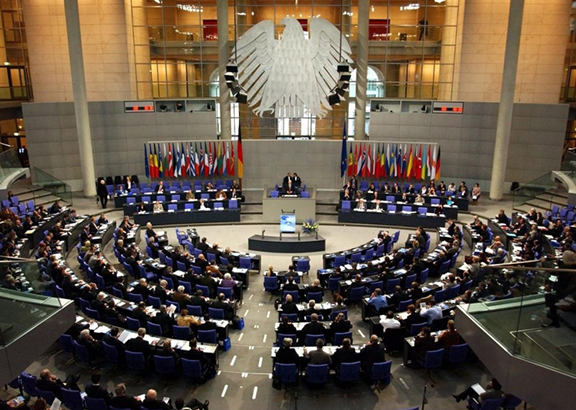Prepared Remarks Dr. Thomas J. Samuelian
Dean, AUA College of Humanities & Social Sciences
National Gallery Tribute to Germany on
2016 Bundestag Resolution on the Armenian Genocide May 15, 2017
|
Germany can and should take the lead in recognizing Artsakh’s de jure independence and encourage other countries to do the same. Not only is this proportional and fitting, it is also the simplest and most logical solution to the Karabagh Conflict.
If it was not clear in 1991, it should be clear to everyone today that it is not possible to turn back the clock and reimpose the Soviet status quo. The world community knows full well that subjecting the Armenians of Artsakh to repressive Azeri misrule of any kind will only risk another Armenian genocide. Yet mystifyingly, territorial integrity remains part of the discourse, tempting the heavily armed and hostile countries to Armenia’s east and west with the mirage that there are grounds to undo Artsakh’s de facto independence by violence and military force. When will this madness end? The 2016 Bundestag Resolution reminds us that this madness should have ended long ago. Genocides do not just happen. They are engineered in the corridors of power. It’s time for Germany to show the world that it can end this pernicious cycle of failed and destructive policies. The most urgent and important way of reversing the harm caused by the Armenian Genocide is to avoid repeating the mistakes of the past. Armenians have the right to protect themselves from becoming collateral damage to mindless geopolitics again. |
Genocide is a crime against humanity. As such, it is the duty of the community of nations to condemn the wrongful act and redress the injury in defense of the community’s own safety and security. The 2016 Bundestag Resolution is a step in that direction. It is significant when a major power forthrightly condemns an egregiously wrongful act and admits its own complicity in that wrong. Condemning wrongful acts is an affirmation of the norms of civilization. That is everyone’s duty, not a favor to the victims. It is forward-looking, not backward-looking. In affirming these norms, Germany took a step to secure its own future and the future of humanity, while setting an example for its unrepentant allies and indifferent bystanders. Affirming international norms of civilized behavior is essential for restoring sanity to a world that is increasingly out of control.
To understand how significant the Bundestag Resolution is, imagine if it had been made in a timely manner a century ago. Instead of Kaiser Wilhelm parading with a fez, Germany would have condemned the jihad against Christians of the Ottoman Empire. Instead of Germany’s military and propaganda machine aiding and abetting the Genocide, Germany would have urged restraint. Instead of trading war stories with Turkish officer-trainees about wiping out the Herero in Southwest Africa, German military advisors might have taught to respect Hague Conventions and protect civilians in time of war. How much horror and destruction would timely action have spared the world?
In his recent studies, Stefan Ihrig documents how Turkey captured the Nazi imagination.
Would Germans in the 1920s have been so mesmerized by the Turkish example had the Armenian Genocide been duly and timely condemned?
It is often hard to know who is more culpable when a crime is committed, the inciter or the perpetrator. In many ways, the inciters are effectively the “authors of the crime.” Those who incite and enable perpetrators impel them to do things they might not have done if left to their own devices.
Imagine how different things would have been if Germany, as Turkey’s WWI ally, had not acquiesced, supported, provided justification, precedents, and encouragement for Turkey’s plan to eliminate its Armenian population.
Would a defeated Turkey, duly and roundly condemned in 1915-16 for crimes against humanity, have been left fully armed after WWI to invade the Caucasus and make a land-grab at the expense of genocide-ravaged Armenia? Unfortunately, this is not just a curious episode from the past. It is as recent as today’s news. If Turkey had been timely condemned and duly disarmed after its defeat in WWI, would Nakhichevan and Karabagh have been part of Azerbaijan? Would Mt. Ararat be on the other side of the border? Would the medieval Armenian capital of Ani be a ghost town? Would the Armenians of Artsakh have had to suffer a hundred years more, defending and liberating themselves as the only option for self-preservation? It is always hard to say what might have been. However, one thing is certain, the consequences of failing to address the Armenian Genocide in a timely and appropriate manner persist, and not just for the victims and perpetrators, but for all humanity.
There are many fruits of the poisonous tree of genocide, denial and delay. There are the obvious benefits to the direct perpetrators and their progeny who continue to profit from the property their grandparents took by savagely dispossessing, deporting and marching the indigenous population to their deaths in the Syrian desert. There are also many others around the world who coveted that land, including German geopoliticians, military strategists, and geologists, who were very well acquainted with the natural wealth of Western Armenia and were not above ingratiating themselves to the Turks by denigrating and advocating the destruction of the Armenians for material advantage. How much was at stake? As of 2015, the amount of known natural resource reserves in Western Armenia is in the range of $2 trillion: minerals, gas, oil, iron, copper, precious metals, coal, water, fertile lands, orchards, and livestock. Who benefits? At a minimum all Turkish citizens, since the taxes, royalties and in many cases profits go to various Turkish state institutions. Among those poisonous fruits, however, there are several that are particularly toxic: the skeletons in the closet and the precedent of impunity.
As Pope Francis said two years ago, the Armenian Genocide is an “open wound,” not just for Armenians but for humanity. Likewise, leaders of the Lutheran Evangelical Church, including Kaiser Wilhelm’s grandson, have acknowledged this wound and expressed contrition for Germany’s role in the Armenian Genocide.
The Armenian Genocide is already irreversibly recognized by the better part of the civilized world. Today, even more than denial, the threat to global security is impunity for genocide. Recognition without reparations poses a catastrophic moral hazard. People learn from the consequences of their actions. If it is possible to “get away” with genocide with little more than a slap on the wrist and handwringing, what is the “take away lesson” for future perpetrators?
Impunity for Genocide, like terrorism and global warming, is a global threat. The Armenian Genocide is not a private, bilateral matter between Armenians and Turks or Armenia and Turkey. Victims and perpetrators cannot agree to make crimes go away. The community has a duty to future generations to act. This is another reason why the 2016 Bundestag Resolution is significant.
Yet, even with recognition, genocidal tendencies do not subside quickly or permanently. Despite institutional handwringing and lip service, the diseases of the human soul often go latent and periodically reappear in outbreaks of intolerance and violence. Perhaps humanity’s genocidal tendencies cannot be cured; but the consequences of these tendencies can and must be addressed if we are not to sacrifice future generations to the barbaric precedents of the past.
It is not a coincidence that one of the most revered saints of the Armenian Church, St. Gregory of Narek, was named a Doctor of the Universal Church by Pope Francis on the centennial commemoration of the Armenian Genocide in 2015. Born in 951 on the south shore of Lake Van, St. Gregory is the doctor of the countless diseases of the soul. In his Book of Lamentations, he diagnosed the ills of the human spirit in great detail and gave the only known cure – the contrite heart searching for redemption through atonement.
As the Bundestag Resolution points out, Germany has shown the way forward not only for itself but also for Turkey and the world. Turkey is in an untenable position: condemned with no process for atoning and finding closure. This is a dead end for the Turks, Turkey and humanity.
With the 2016 Bundestag Resolution, Germany has once again come to Turkey’s aid, but this time with wise counsel and a courageous example. As the Resolution affirms, we all need to be able to turn over a new leaf or else we will remain captives of the past. For this, as Germany knows and as Konrad Adenauer and the Christian Democrats understood, an apology is not enough. The apology must be accompanied by redemption – settling the legal and moral debt.
Condemnation or confession followed by atonement is the path to closure. Only then will we be able to find a way forward. For regional peace, neighbors need to be able to live side-by-side without being haunted by the past.
The losses and unjust enrichment from the Armenian Genocide are so extensive, especially after a hundred years’ delay, that the available remedies are mainly symbolic. Nevertheless, a way forward is to apply the standard measure of reparations: reversible harm should be reversed; irreversible harm should be compensated.
One reversible harm arising from the failure to timely address the Armenian Genocide is the Artsakh situation. The Artsakh situation is one of the many consequences of Germany’s support for Turkey’s genocidal policies and Germany’s own geopolitical ambitions in the Caucasus. Thus, Germany’s recognition of Artsakh’s de jure independence would be a proportional and well-tailored symbolic gesture of good will and atonement.
Most of the work to reverse this wrong has already been done by the Armenians themselves. To show its good faith and commitment to the high principles enunciated in the 2016 Resolution, Germany can and should take the lead in recognizing Artsakh’s de jure independence and encourage other countries to do the same. Not only is this proportional and fitting, it is also the simplest and most logical solution to the Karabagh Conflict.
If it was not clear in 1991, it should be clear to everyone today that it is not possible to turn back the clock and reimpose the Soviet status quo. The world community knows full well that subjecting the Armenians of Artsakh to repressive Azeri misrule of any kind will only risk another Armenian genocide. Yet mystifyingly, territorial integrity remains part of the discourse, tempting the heavily armed and hostile countries to Armenia’s east and west with the mirage that there are grounds to undo Artsakh’s de facto independence by violence and military force.
When will this madness end?
The 2016 Bundestag Resolution reminds us that this madness should have ended long ago. Genocides do not just happen. They are engineered in the corridors of power. It’s time for Germany to show the world that it can end this pernicious cycle of failed and destructive policies.
The most urgent and important way of reversing the harm caused by the Armenian Genocide is to avoid repeating the mistakes of the past. Armenians have the right to protect themselves from becoming collateral damage to mindless geopolitics again. In this reasonable proposition, Armenians should be supported by right-thinking people, such as those who unanimously passed the Bundestag Resolution last year.
In short, the pragmatic and symbolic act of recognizing Artsakh de jure without further delay would be a logical next step to breathe life into the 2016 Bundestag Resolution and show that Germany means what it says.






